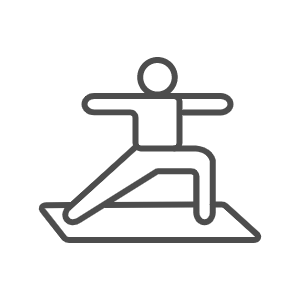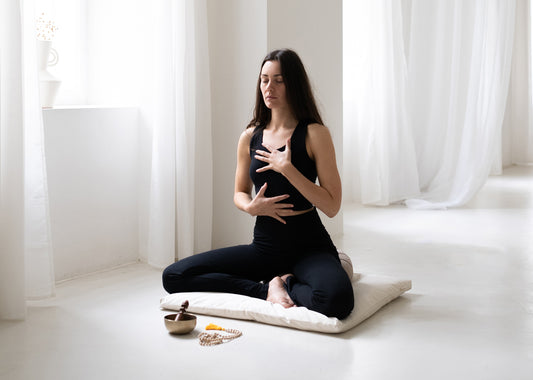
NEW In!
PURE-Matte Light TaupeShopping cart
Your shopping basket is empty
Yoga

Meditation
Sets & Bundles

I studied psychology because I love people, their experiences and behavior
interest and fascinate. In particular, I have always been interested in what makes each of us unique and how our personality influences our path in life. For a long time I couldn't really put my finger on what fascinated me about yoga. I just felt drawn to yoga, over and over again, until one day it grabbed me so much that I couldn't let it go. For me, these two worlds, psychology and yoga, complement each other very well and profitably in many ways, because at their core both are about self-knowledge and human mental health.
But let's take a step back: Most people find yoga through the physical aspect of asana practice. The movements, which offer strengthening and stretching at the same time, usually make us feel more comfortable and connected to our own bodies. The deeper we delve into yoga, the more important pranayama and meditation practice become over time - those aspects of yoga that are not visible and "instagrammable", but rather allow us to turn inward. And this is exactly where there is great potential for strengthening our mental health. Because yoga is not just a practice on the mat, it goes much further. Through yoga we can learn mindfulness in everyday life, letting go, something about yoga philosophy and life guidelines as well as strengthening rituals. This makes yoga much more than just physical activity.
Yoga is the journey of the self through itself to itself (Bhagavad Gita). Yoga is a holistic teaching and philosophy originating from India that aims to calm the fluctuations of the mind and achieve pure consciousness. To put it more simply, you could say that yoga helps us to come into a deep connection with ourselves and our origins. Especially in the world we live in, filled with streaming services, social media, and long screen time, we are often distracted from true connection with ourselves. Without a break we switch from one screen to another, from one input to the next. The book “The Lost Connection” sees this lost connection to ourselves, to other people, to the meaningfulness of our work, etc. as the main cause of the increasing number of depression and anxiety disorders. On the other hand, there are now numerous studies on the positive effectiveness of yoga our psychological well-being.
How can yoga support mental health?
Even a good asana practice can make us feel really good. The body was warmed up, strengthened, stretched and relaxed. Tensions can be released and inequalities have been brought into balance. If we were still in the moment and completely with ourselves, then we also practiced mindfulness. And being in the moment is proven to make us happier than letting our minds wander.
If we combine the asana practice with pranayama techniques, i.e. special yogic breathing exercises, this effect will increase significantly. It is not for nothing that breathing techniques are also used in psychotherapy, among other things. They are the fastest way to influence our autonomic nervous system. In this way we can breathe away stress by breathing deeply into our stomach and consciously breathing out long and slowly.
Breathing is our biggest lever, especially in situations that (over)challenge us and when we have the feeling that our mental health is not going well. Sitting in meditation at the end of a yoga practice can contribute to self-knowledge , connection, inner peace and much more. Above all, meditation gives us a break from constantly doing, having to do and absorbing information.
A yoga class can feel as cathartic as a little therapy. Because we move, breathe consciously and don't distract from ourselves. It's time for ourselves and with ourselves. This can be very insightful and beneficial. Psychology and psychotherapy use numerous exercises and relaxation techniques that arise from meditation practice, such as body scans, mindfulness exercises and muscle relaxation. Some psychotherapists even have yoga training and specifically combine the two worlds, such as Cuno and Richter, the authors of the book “ Yoga in psychotherapy”.
When is yoga and meditation practice not recommended?
In my experience, the positive effects of yoga also have certain limits. Because yoga is always a confrontation with ourselves and can challenge us emotionally. In some yoga practices we are alone on the mat without the distraction of music or visual impressions and that is not always easy to endure. In some phases of life, this self-confrontation must take place slowly and with guidance . If
If psychological stress lasts for several weeks, you reach your limits with your attempts to cope or are even overwhelmed, you should seek professional help, for example from a psychological psychotherapist. If you want to use yoga to strengthen your mental health, try creating a few positive routines that give you a break in your everyday life and are good for you.
Here is a suggestion on how you can get started:
Dr. Nora Jacob is a psychologist and works as a coach, workshop moderator and author, among other things. In her podcast “creativity x you” she talks about creativity and positive psychology. She is also a yoga and meditation teacher in Munich and has uploaded a “recharge meditation” to Insight Timer, which you can listen to for free.
Click here to go to Dr.'s website. Nora Jacob creativityxyou.com and here you can find more exciting content on Instagram: the.psychologist.yogini

“Reducing obstacles in the mind and blockages in the body results in our physical functions being in harmonious balance.” Yoga Sutra 2.43 ......
Continue reading
Autumn and winter can be a challenging time for many people, as the body becomes more susceptible to illness and moods are often depressed. Howe...
Continue reading